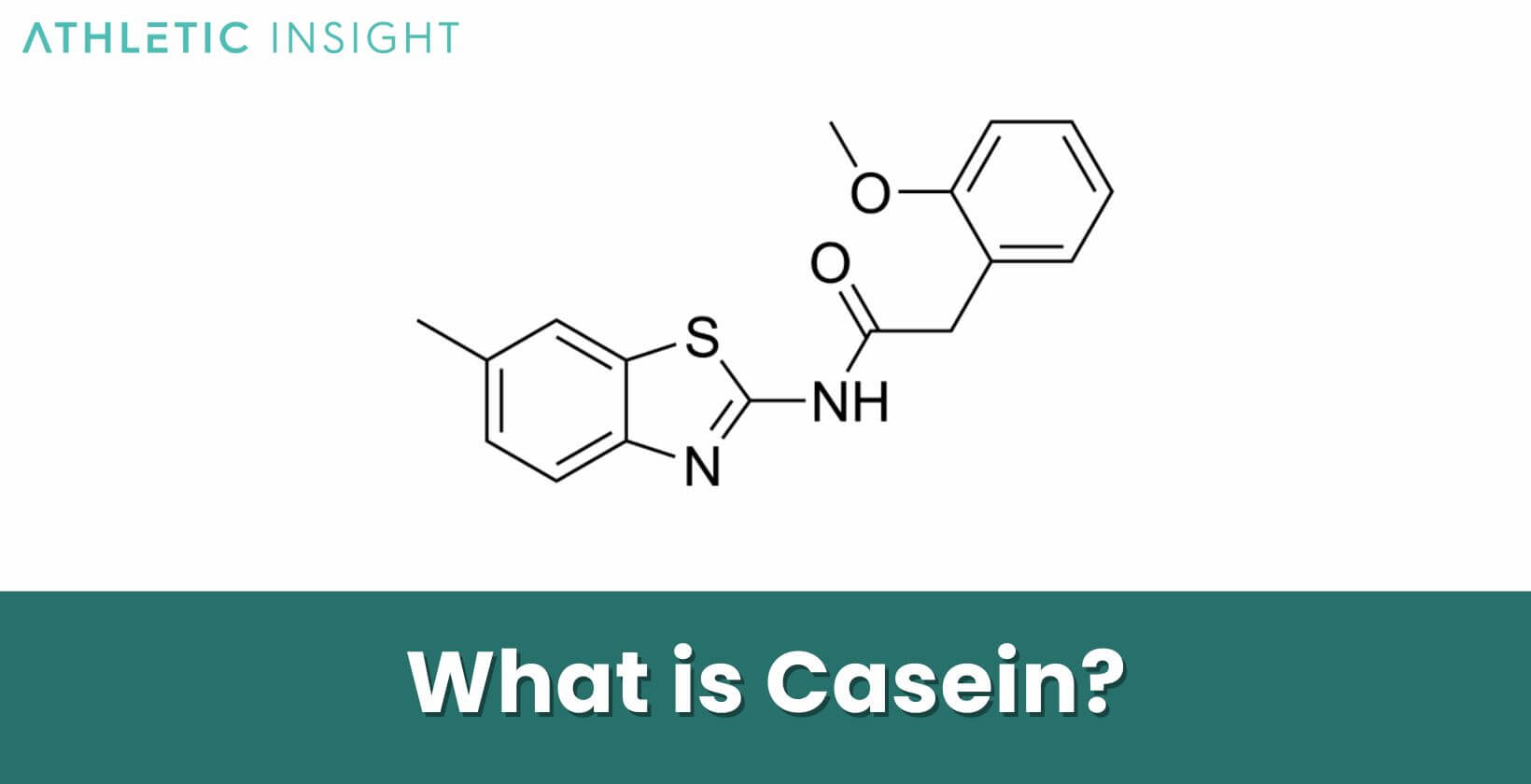Casein is a multifaceted component integral to various domains, from nutrition science to culinary arts and biotechnology. Well known for its nutritive value and functional properties, it serves as a slow-releasing protein source that supports muscle anabolism and catabolic resistance. These characteristics make it a subject of interest not only to individuals keen on optimizing their dietary regimen but also to scientists and manufacturers interested in new applications.
Understanding casein in depth entails not just its dietary benefits but also a critical examination of its uses in diverse sectors, impactful benefits on health and physique, and potential adverse effects that arise from its consumption.
What is Casein?
Casein proteins exhibit a unique molecular conformation, fostering a gradual absorption rate that’s unlike any other protein group. Sourced predominantly from bovine lactation, casein constitutes a complex group of phosphoproteins with an unparalleled amino acid profile that includes a high glutamine and branched-chain amino acid content.

While other proteins provide transient nutritional bursts, casein forms a steady state of amino acid elevation, prolonging the period of protein synthesis and promoting a salutary effect on muscle maintenance and growth. This distinctive time-release property has far-reaching implications spanning from nutritional support during sleep to potential uses in controlling food intake and managing body weight.
What does Casein taste like?
Casein is not known for its flavor, which is why it’s rarely found in culinary applications in its isolated form. Natural casein in dairy products lends a subtle depth, contributing to the creamy textures and rich mouthfeel prized in milk-based delicacies. The introduction of flavor enhancers and blending agents transforms casein into palatable products, with a variety of taste profiles designed to cater to diverse consumer preferences in the protein supplement market. Pleasing taste, paired with its nutritional resume, is what vaults casein protein into popularity among protein supplements.
Is Casein a Good Protein?
Yes, casein is a good protein. In fact, casein is more than just a good protein, it’s an imperative building block in the framework of a comprehensive dietary plan. With a peerless affinity for fulfilling an extended amino acid requirement, it stands as a dietetic linchpin for those who need steady protein input, particularly overnight or during intermittent fasting.
When pitted against other proteins in terms of sustaining plasma amino acid levels, casein consistently ranks among the most favorable for maintaining anabolic conditions in the body, an accolade that supports its inclusion in the nutritional arsenal of those intent on physiological betterment.
What is the nutritional importance of Casein?
The nutritional magnitude of casein lies in its ability to secure an anabolic milieu, which is quintessential for bodily recuperation and growth. In juxtaposition with proteins absorbed rapidly, casein’s elongated digestion modulates the metabolic rate in a manner that may favor fat oxidation over storage. Nutritional strategies employing casein, either through whole foods or supplements, exploit this index for attenuating muscle protein breakdown—a boon for attaining lean tissue accrual or preservation in hypoenergetic conditions.
Beyond its muscle-centric properties, casein contains bioactive peptides with purported health benefits, including immunomodulation and potential antimicrobial activities, solidifying its status as a nutritionally imperative protein source.
What is the primary use for Casein?
Primarily, casein is engaged for its undeniable proficiency in fostering muscle protein synthesis over protracted durations. This is instrumental not only for athletes in quest of lean mass but also for individuals aiming to preserve muscle during weight loss or aging. Its digestion results in a slow and continuous release of amino acids, engendering a state of anti-catabolism that is particularly beneficial when food intake is not possible for several hours.
The utility of casein stretches beyond nutrition; its emulsifying and binding abilities have sanctioned its use as a food additive, enhancing texture and stability in products such as ice cream and cheese.
How does Casein improve muscle growth?
The enhancement of muscle growth via casein intake is chiefly due to its capacity to sustain elevated plasma amino acid concentrations, crucial for stimulating and maintaining muscle protein synthesis. Research delineates that protein intake before sleep can augment overnight muscle protein synthesis, a process wherein casein figures prominently due to its slow digestion.
Casein also has been demonstrated to abate protein breakdown, an often-overlooked facet of muscle accretion. The amalgamation of these processes creates an optimal physiologic state for muscular improvement, which becomes especially relevant when one considers the longitudinal benefits accrued from consistent casein intake.
Does Casein build muscle overnight?
No, casein does not build muscle overnight. Instead, it establishes an environment conducive to natural anabolic processes during sleep. This subtle yet significant distinction highlights the importance of facilitating endogenous night-time recovery and growth mechanisms.
Studies illustrate that casein ingestion prior to sleep promotes an increase in circulating amino acids, thereby enhancing the body’s capacity to execute nocturnal muscular repair and hypertrophy. While not a builder per se, casein serves as a foundational ally in the pursuit of muscle growth.
Does Casein help in weight loss?
Yes, casein’s propensity to prolong satiety, reduce appetite, and potentially support a higher metabolic rate advocates for its inclusion in weight management regimens. The accentuated feeling of fullness post-consumption can be associated with a lower overall energy intake, an interaction that bodes well for caloric restriction and adipose tissue reduction.
The retention of muscle mass during periods of energy deficit is indispensable for preserving the metabolic rate, where casein’s antiproteolytic properties may further support weight loss by favouring lean tissue preservation.
Which foods are high in Casein?
The majority of casein-rich foods are dominated by dairy products, champions of nutrient density and satiety. Casein’s prevalence in these foods underpins not just their textural allure but also their capacity to contribute significantly to daily protein requirements. Foods such as cheese exhibit a remarkable casein concentration, providing a substantial protein boost in a compact serving.

The digestibility and biological value of the casein in these foods are influenced by their preparation and fermentation, potentially altering their nutritional impact. As dietary staples in various cultures, these casein sources are pivotal in meeting protein needs across age groups and lifestyles.
- Ice cream
- Cheese
- Milk
- Yogurt
- Butter
1. Ice cream
Ice cream, beloved for its creamy indulgence, owes its smooth constitution in part to the casein it harbors. Premium ice cream products especially may exhibit a higher density of milk solids, where casein inherently resides. Casein’s functional properties as an emulsifier contribute to the notable consistency of ice cream, further accentuating its role in this defeat dessert. While indulgent, when consumed in moderation, ice cream can contribute a measure of casein to one’s diet.
2. Cheese
Cheese, which comes in many varieties, operates as a powerhouse of casein. The cheese-making process capitalizes on the properties of casein, isolating it in the curd from liquid whey. Aged cheeses, such as Parmesan, can contain upwards of 25 grams of protein per ounce, a testament to the concentration process and the enrichment of casein within. These proteins confer not just nutritional benefits but also contribute to the textural integrity and flavor profile that define cheese throughout its vast spectrum.
3. Milk
Milk is the fundamental source of casein, boasting a naturally high content that forms the backbone of its nutritional reputation. Variations in milk source and processing can impact casein content; for instance, certain A2 milks, from specific cow breeds, prioritize a form of casein that’s reputed for its digestibility. Regardless, the presence of casein in milk highlights its role as a staple food, supplying valuable proteins to supplement human nutrition from infancy through adulthood.
4. Yogurt
Yogurt, particularly in its strained forms such as Greek yogurt, is a celebrated casein-centric food. The straining process concentrates milk proteins, thus elevating the casein content and providing an even richer source of this slow-digesting protein. Greek yogurt serves not only as a culinary delight but also a potent staple in the diets of health-conscious individuals.
5. Butter
Butter, while typically associated with its fat content, imbues trace quantities of casein, a remnant of its dairy origin. It highlights how even in fat-centric dairy processes, the ubiquity of casein is such that its presence manifests even in minimal proportions, silently contributing to the dairy product’s nutritional and rheological attributes.
What is a Casein shake?
The casein shake is the distilled essence of casein’s practical application as a nutritional supplement. Blendable, customizable with flavors, and convenient, it acts as a direct conduit of casein protein to those seeking its benefits, whether as a tool for nocturnal nutrition management or as part of a structured meal plan catering to extended periods without food intake. This reinforces the role of casein shakes in the context of dietary strategies that leverage its slow-release profile.
Which is better, Casein or Creatine?
The dichotomy between casein and creatine unveils two distinct, yet each extraordinary, facets of nutritional supplementation. While casein provides a staggered protein release beneficial for muscle integrity and growth, creatine excels in the realms of power output and muscular endurance. One’s decision to utilize casein or creatine, or a combination thereof, should align with individual fitness ambitions and the pith of their workout regimen, where both can play complementary roles in an optimized nutrition plan tailored to augment performance and recovery.
Is Casein Better than Whey Protein?
When evaluating protein supplementation, casein and whey serve different, often complementary, roles. Casein’s gaze is cast toward enduring nutrient supply, making it the protein of choice in circumstances that demand a prolonged amino acid delivery. Alternatively, whey protein, excels in post-exercise scenarios where the quick replenishment of amino acids is paramount. The conundrum of ‘better’ dissolves in the recognition of their respective functions and the elegance of their deployment in synchronization with one’s temporal nutritional requirements.
Who uses Casein protein powder?
The archetypal consumer of casein protein powder spans a spectrum from the bodybuilder investing in post-training recovery to the office worker managing their macronutrient intake. The versatility of casein allows it to assume a role in diverse dietary strategies, catering to those with requirements for steady-state nutrition. This widespread user base reflects the intrinsic value of casein and underscores its applicability across an array of nutritional landscapes.
Is Casein recommended for Sports Athletes?
Yes, casein is recommended for sports athletes. Casein’s accolades for supporting muscle metabolism make it a recommended constituent of sports athletes’ nutrition and overall health. Its advantages enshrine it as a strategic element, aligning with the metabolic cycles and nutritional exigencies faced by athletes.

Through savvy manipulation of casein intake, these sportive individuals can orchestrate a nutritional paradigm that steadfastly undergirds various phases of their training and recovery protocols.
What is the recommended daily intake of Casein?
The recommended daily intake of casein is 20 to 40 grams. Dietary reference intakes (DRIs) and the Dietary Guidelines for Americans (DGA) provide baselines, yet one’s intake must be fine-tuned to reflect their biodemographics, activity levels, and personal health objectives. These parameters guide the allocation of casein within the broader context of daily protein requirements, ensuring its strategic incorporation into one’s diet.
Does the amount of daily intake of Casein vary per person?
Yes, the daily intake of casein does differ from person to person. Factors such as metabolic rate, training intensity, lean body mass, and dietary structure inform the modulation of casein dosage. This calibration of intake ensures the harmonization of casein with the existing nutritional framework and objectives, translating into a bespoke dietary component that resonates with the individual’s physiological narrative.
What are the Benefits of Casein?
The benefits of casein protein accrue through its role in muscle metabolism, satiety, and overall nutrient density. The ability of casein to perpetuate a heightened state of protein synthesis holds particular allure for those seeking to strengthen or maintain muscle mass over time.
Emerging insights into casein-derived bioactive peptides suggest a secondary tier of potential health benefits, implicating casein in possible roles ranging from blood pressure modulation to antimicrobial activity, thus adding layers to its already robust nutritional profile.
- Muscle metabolism
- Satiety
- Nutrient density
- Blood pressure modulation
- Antimicrobial activity
What are the Side Effects of Casein?
Casein’s side effects, while not universal, can present in susceptible individuals. A predilection for discomfort associated with lactose or milk proteins can make casein’s consumption less tolerable for some. Specific peptides within casein have also been associated with allergic reactions, necessitating vigilance among those with known dairy sensitivities.
- Allergic reactions
- Stomach discomfort
Is Casein an inflammatory?
Casein’s status as an inflammatory agent is not substantiated across the general populous; however, exceptions arise in scenarios of specific casein protein intolerance or milk protein allergies. Where inflammatory responses do occur, they are generally localized within this subgroup with hypersensitivity to dairy constituents.
Nonetheless, the potential anti-inflammatory effects of specific casein-derived peptides paint a nuanced picture, suggesting that while it can incite inflammatory responses in a select demographic, it may also exert salutary anti-inflammatory effects more broadly.
Does Casein affect kidneys?
For those in the bloom of renal health, casein does not pose a risk to kidney function when its consumption falls within the recommended dietary practice. However, in the context of renal compromise, an augmented protein intake, inclusive of casein, necessitates a close evaluation of diet and possible adjustment to obviate undue renal strain.
Does Casein protein raise blood pressure?
Yes, casein protein can raise blood pressure, according to research. The conversion of casein into bioactive peptides during digestion brings forth compounds with potential antihypertensive actions that can attenuate vascular tension. This biotransformation elucidates a favorable portrait of casein with regard to blood pressure modulation, refuting the notion of it being causally linked to blood pressure elevation in otherwise healthy individuals.
Is it safe to use a Casein Supplement?
Casein supplementation is safe for the broader population. Pre-existing health conditions, particularly those implicating the renal and digestive systems, as well as personal sensitivities to dairy proteins, constitute the primary caveats that stipulate the cautious use of casein supplements. Within these bounds, casein supplements emerge as a salubrious adjunct to dietary regimens aligned with enhanced nutrition and targeted nutritional timing.



